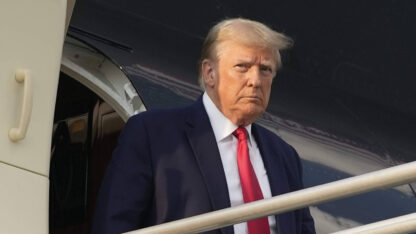The charges against Donald Trump in the Georgia election interference case seek to criminalize political speech and advocacy conduct that the First Amendment protects, a lawyer for the former president said Thursday as he argued that the indictment should be dismissed.
The hearing before Fulton County Superior Court Judge Scott McAfee was on a filing from Trump and on two pretrial motions by co-defendant David Shafer and centered on technical legal arguments. It marked something of a return to normalcy after the case was rocked by allegations that District Attorney Fani Willis improperly benefited from her relationship with Nathan Wade, a special prosecutor hired for the case.
“There is nothing alleged factually against President Trump that is not political speech,” Trump’s lead lawyer, Steve Sadow, told the judge. Sadow said a sitting president expressing concerns about an election is “the height of political speech” and that is protected even if what was said ended up being false.
Prosecutor Donald Wakeford countered that Trump’s statements are not protected by the First Amendment because they were integral to criminal activity.
“It’s not just that they were false. It’s not that the defendant has been hauled into a courtroom because the prosecution doesn’t like what he said,” Wakeford said, adding that Trump is free to express his opinion and make legitimate protests. “What he is not allowed to do is to employ his speech and his expression and his statements as part of a criminal conspiracy to violate Georgia’s RICO statute, to impersonate public officers, to file false documents, to make false statements to the government.”
Willis used Georgia’s Racketeer Influenced and Corrupt Organizations law, an expansive anti-racketeering statute, to charge Trump and 18 others with allegedly participating in a wide-ranging conspiracy to overturn the state’s 2020 election results.
Most of the charges against Shafer, a former state Republican Party chairman, have to do with his involvement in the casting of Electoral College votes for Trump by a group of Georgia Republicans even though the state’s election had been certified in favor of Democrat Joe Biden. The charges against Shafer include impersonating a public officer, forgery, false statements and writings, and attempting to file false documents.
His lawyer, Craig Gillen, argued that the activity Shafer engaged in was lawful at the time and that Schafer was acting in accordance with requirements of the Electoral Count Act. Because a legal challenge to the presidential election results was pending on Dec. 14, 2020, when it came time for electors to meet to cast Georgia’s electoral votes, Gillen said it was up to Congress to determine whether a Democratic or Republican slate of electors should be counted for the state. He said that means Shafer and the other Republicans who met to cast electoral votes were acting properly.
Gillen said the accusation that Shafer and others were impersonating a public officer, namely a presidential elector, does not hold water because electors are not considered public officers. Prosecutor Will Wooten argued that a presidential elector is clearly an office created by law and that Shafer and others were charged because they falsely presented themselves as the state’s official presidential electors.
Gillen also asked that three phrases be struck from the indictment: “duly elected and qualified presidential electors,” “false Electoral College votes” and “lawful electoral votes.” He said those phrases are used to assert that the Democratic slate of electors was valid and the Republican slate was not. He said those are “prejudicial legal conclusions” about issues that should be decided by the judge or by the jury at trial.
Wooten opposed the move, saying “every allegation in an indictment is a legal conclusion.”
Trump and the others were indicted last year, accused of participating in a scheme to try to illegally overturn the 2020 presidential election in Georgia, which the Republican incumbent narrowly lost to Biden.
All the defendants were charged with violating the anti-racketeering law, along with other alleged crimes. Four people charged in the case have pleaded guilty after reaching deals with prosecutors. Trump and the others have pleaded not guilty. No trial date has been set. Willis has asked that the trial begin in August.
The allegations that Willis engaged in an improper relationship were explored over several days in an evidentiary hearing last month that delved into intimate details of Willis’ and Wade’s personal lives. The judge rejected defense efforts to remove Willis and her office as long as Wade stepped aside. But McAfee did give the defendants permission to seek a review of his decision from the state Court of Appeals.
Also this month, the judge dismissed six of the 41 counts in the indictment, including three against Trump, finding that prosecutors failed to provide enough detail about the alleged crimes.








